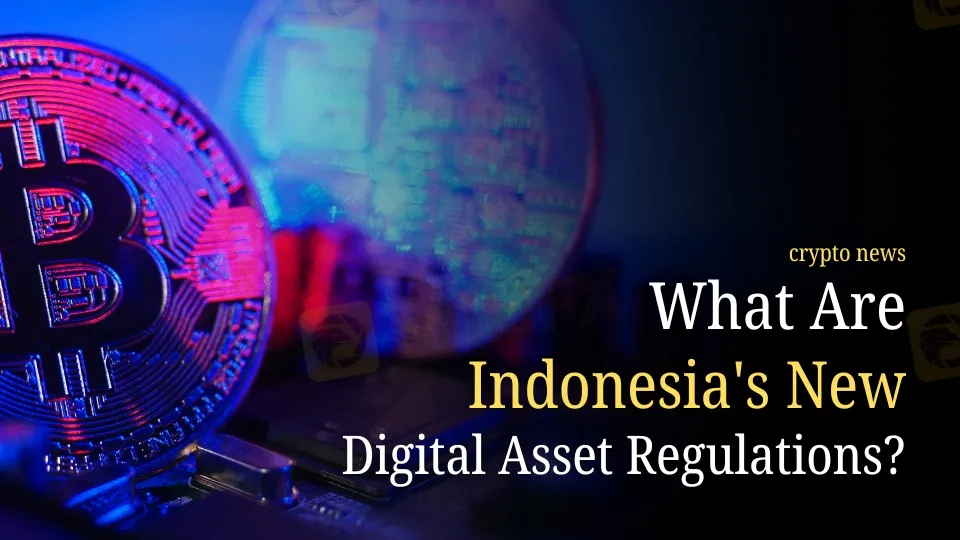简体中文
繁體中文
English
Pусский
日本語
ภาษาไทย
Tiếng Việt
Bahasa Indonesia
Español
हिन्दी
Filippiiniläinen
Français
Deutsch
Português
Türkçe
한국어
العربية
What Are Indonesia's New Digital Asset Regulations?
Abstract:Indonesia’s crypto rules are changing as OJK leads regulation, VAT impacts trading, and the country rises as a key global hub for digital assets.

The Financial Services Authority (OJK) is taking over regulatory oversight from the Trade Ministry, causing substantial changes in Indonesia's digital asset ecosystem. With new legislation due to go into force, the country is prepared to overhaul its crypto ecosystem and cement its place as a worldwide leader in digital assets. Here's all you need to know about the changing regulations and their possible consequences.
OJK Takes Over Indonesia's Crypto Regulation
Indonesia revised its Financial industry Law in 2024, moving authority for the digital asset industry from the Commodity Futures Trading Agency (Bappebti) to the Financial Services Authority (OJK). The transition, which begins on January 12, intends to bring Indonesia's cryptocurrency rules in line with global norms.
OJK head Mahendra Siregar underlined the need for a smooth turnover, saying, “We've been working closely with the Trade Ministry to ensure a smooth process.” Once adopted, the rule will serve as the legal foundation for the transition.
The OJK has created a three-phase transition plan that will take place over the next two years. These include revising current legislation, developing new recommendations, and offering assistance to Virtual Asset Service Providers (VASPs). Stakeholders generally support this decision, citing OJK's knowledge as a crucial asset.

VAT on Crypto Transactions Sparks Debate
As Indonesia's legal environment transforms, a new 11% Value-Added Tax (VAT) on digital asset transactions, which went into force on January 1, has caused criticism. Industry executives argue that this levy would stifle the sector's expansion.
Oscar Darmawan, CEO of Indodax, Indonesia's largest exchange, emphasized the possible negative consequences of the VAT. “Balanced policies will promote a more favorable ecology. Crypto assets are not subject to VAT in many jurisdictions since they are deemed part of a financial transaction,” he said.
Despite their reservations, VASPs like Indodax are determined to comply with the new VAT while campaigning for its modification.
Indonesia's Rising Position as a Global Crypto Leader
Indonesia has become one of the world's major digital asset marketplaces. Indonesians spent Rp556.53 trillion ($34.5 billion) in the first 11 months of 2024, a 350% increase over the previous year. In addition, the country has risen in the Chainalysis Global Adoption Index, ranking third internationally in 2024.
Experts credit this increase to a mix of increasing adoption rates, new platforms, and supporting regulatory frameworks. Despite ongoing hurdles, Indonesia's digital asset industry shows no signs of faltering.
Final Thought
Indonesia's new digital asset legislation represents a watershed point in the country's crypto industry. As the OJK takes leadership and strives to apply worldwide best practices, the industry will gain stability and confidence. While problems such as the VAT tax exist, Indonesia's stratospheric ascent as a digital asset center highlights its potential to dominate the global crypto economy.

Disclaimer:
The views in this article only represent the author's personal views, and do not constitute investment advice on this platform. This platform does not guarantee the accuracy, completeness and timeliness of the information in the article, and will not be liable for any loss caused by the use of or reliance on the information in the article.
Read more

Vantage Markets Review 2025: Trusted Forex and CFD Trading Since 2009
Explore our 2025 Vantage Markets review! A trusted Sydney-based broker since 2009, offering forex, CFDs, low spreads, global regulation, and 24/7 support. Trade from $50!

IronFX vs Exness Review 2025: Comprehensive Broker Comparison
Explore an in-depth comparison between IronFX and Exness. Compare licensing, features, regulation, trading platforms, and customer service for smarter trading decisions.

eToro Review 2025: Top Trading Opportunities or Hidden Risks?
Is eToro a trustworthy broker or a scam in 2025? Explore its regulations, user reviews, and reputation to decide if it’s safe for trading forex, stocks, and crypto. Read now!

ASIC Urges Financial Licensees to Fix Register Errors Before 2026 Deadline
ASIC has warned AFS licensees to urgently correct errors on the Financial Advisers Register, with over 4,600 advisers still not meeting the 2026 qualification standard.
WikiFX Broker
Latest News
How much money will you earn by investing in Vantage Broker?
IronFX vs Exness Review 2025: Comprehensive Broker Comparison
Fraudsters Are Targeting Interactive Brokers' Users with Lookalike Emails
Interactive Brokers: Global Office Visits and Licensing Details
Top Tips to Choose the Best Forex Broker in 2025
SEBI Notifies New F&O Rules for Investors - New Derivative Trading Limits & More Amendments
U.S. Jobs Data Released: A Potential Boost for Gold Prices
SkyLine Guide 2025 Malaysia: 100 Esteemed Judges Successfully Assembled
Everything you need to know about ADSS
Vantage Markets Review 2025: Trusted Forex and CFD Trading Since 2009
Currency Calculator


